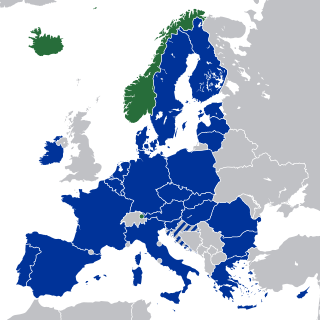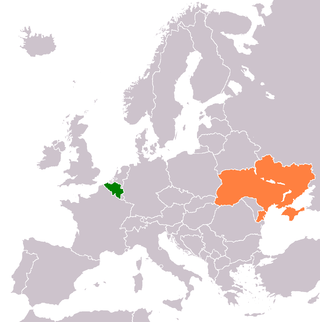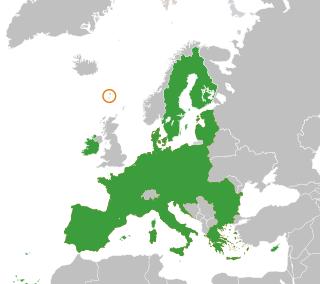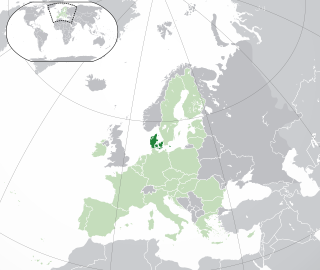
Being part of the Kingdom of Denmark, the foreign relations of Greenland are handled in cooperation between the government of Denmark and the government of Greenland.
Iceland took control of its foreign affairs in 1918 when it became a sovereign country, the Kingdom of Iceland, in a personal union with the King of Denmark. As a fully independent state, Iceland could have joined the League of Nations in 1920, but chose not to do so for cost reasons. It negotiated with Denmark to initially carry out most of its foreign relations, while maintaining full control. Denmark appointed a diplomatic envoy (Ambassador) to Iceland in 1919 and Iceland reciprocated in 1920, opening an embassy in Copenhagen. Iceland established its own Foreign Service in April 1940 when Denmark became occupied by Nazi Germany and ties between the two countries were severed. The Republic of Iceland was founded in 1944. The Icelandic foreign service grew slowly in the post-WWII period, but increased rapidly after the mid-1990s. Iceland's closest relations are with the Nordic states, the European Union and the United States. Iceland has been a member of the United Nations since 1946. Iceland was a founding member of the World Bank in 1946 and NATO in 1949. In terms of European integration, Iceland was a founding member of the OEEC in 1948 and the Nordic Council in 1952, it joined EFTA in 1970, was a founding member of the CSCE in 1973 and the EEA in 1992 and joined Schengen in 1996.

The European Economic Area (EEA) was established via the Agreement on the European Economic Area, an international agreement which enables the extension of the European Union's single market to member states of the European Free Trade Association (EFTA). The EEA links the EU member states and three of the four EFTA states into an internal market governed by the same basic rules. These rules aim to enable free movement of persons, goods, services, and capital within the European single market, including the freedom to choose residence in any country within this area. The EEA was established on 1 January 1994 upon entry into force of the EEA Agreement. The contracting parties are the EU, its member states, and Iceland, Liechtenstein, and Norway. New members of EFTA would not automatically become party to the EEA Agreement, as each EFTA State decides on its own whether it applies to be party to the EEA Agreement or not. According to Article 128 of the EEA Agreement, "any European State becoming a member of the Community shall, and the Swiss Confederation or any European State becoming a member of EFTA may, apply to become a party to this Agreement. It shall address its application to the EEA Council." EFTA does not envisage political integration. It does not issue legislation, nor does it establish a customs union. Schengen is not a part of the EEA Agreement. However, all of the four EFTA States participate in Schengen and Dublin through bilateral agreements. They all apply the provisions of the relevant Acquis.

The special territories of members of the European Economic Area (EEA) are the 32 special territories of EU member states and EFTA member states which, for historical, geographical, or political reasons, enjoy special status within or outside the European Union and the European Free Trade Association.

This is a list of referendums related to the European Union, or referendums related to the European Communities, which were predecessors of the European Union. Since 1972, a total of 48 referendums have been held by EU member states, candidate states, and their territories, with several additional referendums held in countries outside the EU. The referendums have been held most commonly on the subject of whether to become a member of European Union as part of the accession process, although the EU does not require any candidate country to hold a referendum to approve membership or as part of treaty ratification. Other EU-related referendums have been held on the adoption of the euro and on participation in other EU-related policies.

Although there has been a large degree of integration between European Union member states, foreign relations is still a largely intergovernmental matter, with the 27 states controlling their own relations to a large degree. However, with the Union holding more weight as a single entity, there are at times attempts to speak with one voice, notably on trade and energy matters. The High Representative of the Union for Foreign Affairs and Security Policy personifies this role.

Greenland, an autonomous territory within the Kingdom of Denmark is one of the EU members’ overseas countries and territories (OCT) associated to the European Union. Greenland receives funding from the EU for sustainable development and has signed agreements increasing cooperation with the EU.

Switzerland is not a member state of the European Union (EU). It is associated with the Union through a series of bilateral treaties in which Switzerland has adopted various provisions of European Union law in order to participate in the Union's single market, without joining as a member state. Among Switzerland's neighbouring countries, all but one are EU member states.

This is a timeline of European Union history and its previous development.

The Danish Realm, officially the Kingdom of Denmark, or simply Denmark, is a sovereign state consisting of a collection of constituent territories united by the Constitutional Act, which applies to the entire territory. It consists of metropolitan Denmark—the kingdom's territory in continental Europe and sometimes called "Denmark proper" —and the realm's two autonomous regions: the Faroe Islands in the North Atlantic and Greenland in North America. The relationship between the three parts of the Kingdom is known as Rigsfællesskabet.

Greenland was a European Parliament constituency for elections in the European Union covering the territory of Greenland. It seceded from the European Community in 1985. It was represented by one Member of the European Parliament.

Relations between Canada and the European Union (EU) and its forerunners date back to the 1950s. While the relationship is primarily an economic one, there are also matters of political cooperation. Canadians also use English and French — both European languages — as official and majority languages.

Being part of the Kingdom of Denmark, the foreign relations of Faroe Islands are handled in cooperation with the Danish government and Government of Faroe Islands.

Belgium–Ukraine relations are foreign relations between Belgium and Ukraine. Diplomatic relations were established in 1992. Belgium has an embassy in Kyiv; Ukraine has an embassy in Brussels and two honorary consulates. Although politically the two nations are not closely connected, they have a long history of economic integration and trade, with Belgian investment playing a role in the contemporary Ukrainian economy. Belgium is a member of the European Union, which Ukraine applied for in 2022. Both countries are full members of Council of Europe.

The Faroe Islands, a self-governing nation within the Kingdom of Denmark, is not part of the EU, as explicitly asserted by both Rome treaties.
A referendum on continued membership of the European Communities (EC) was held in Greenland on 23 February 1982.

Greenlandic independence is a political ambition of some political parties, advocacy groups, and individuals of Greenland, an autonomous territory within the Kingdom of Denmark, to become an independent sovereign state.

Denmark in the European Union refers to the historical and current issues of Denmark's membership in the European Union (EU). Denmark has a permanent representation to the EU in Brussels, led by ambassador Jonas Bering Liisberg.

After being a part of the European Communities (EC) for twelve years, Greenland withdrew in 1985. It had joined the EC in 1973 as a county of Denmark, even though a majority in Greenland was against joining. In a consultative referendum in 1982, 53% of the electorate of Greenland voted to withdraw from the Communities. This latter referendum became possible after the introduction of home rule in Greenland in 1979. Following its withdrawal, which was regulated through the Greenland Treaty, the relationship between Greenland and the EC was partly settled through an association under Overseas Countries and territories (OCT) status. In recent years, the Greenlandic withdrawal from the European Communities has marginally been referred to as "Greenxit".














